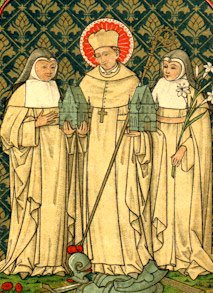Gilbert of Sempringham
| Saint Gilbert of Sempringham | |
|---|---|

Saint Gilbert with two nuns
|
|
| Priest and religious founder | |
| Born | ca. 1085 Sempringham, Lincolnshire, Kingdom of England |
| Died | 4 February 1189 or 1190 Sempringham, Lincolnshire, Kingdom of England |
| Venerated in |
Roman Catholic Church (Canons Regular of St Augustine), Church of England |
| Canonized | 1202, Rome, Papal States by Pope Innocent III |
| Feast | 4 February |
Gilbert of Sempringham, CRSA (c. 1083 – 4 February 1190), the founder of the Gilbertine Order, was the only Englishman to found a conventual order, mainly because the Abbot of Cîteaux declined his request to assist him in organising a group of women who wanted to live as nuns, living with lay brothers and sisters, in 1148. In the end he founded a double monastery of canons regular and nuns.
Gilbert was born at Sempringham, near Bourne in Lincolnshire, the son of Jocelin, an Anglo-Norman lord of the manor, who unusually for that period, actively prevented his son from becoming a knight, instead sending him to the University of Paris to study theology. Some physical deformity may have made him unfit for military service, making an ecclesiastical career the best option. When he returned in 1120 he became a clerk in the household of Robert Bloet, Bishop of Lincoln, started a school for boys and girls (the existing primary school at Pointon is still named after him) and was ordained by Robert's successor, Alexander. Offered the archdeaconry of Lincoln, he refused, saying that he knew no surer way to perdition.
When Gilbert's father died in 1130 he became lord of the manor of Sempringham. In 1131 he founded the Gilbertine Order, and constructed at Sempringham, with the help of Alexander, a dwelling and cloister for nuns, at the north of the church of St Andrew. Eventually he had a chain of twenty-six convents, monasteries and missions. A custom developed in the houses of the order called "the plate of the Lord Jesus", whereby the best portions of the dinner were put on a special plate and shared with the poor. In 1148 he approached the Cistercians for help. They refused because he included women in his order. The male part of the order consisted of Canons Regular.
...
Wikipedia
